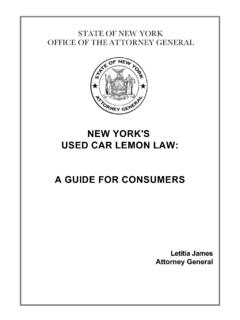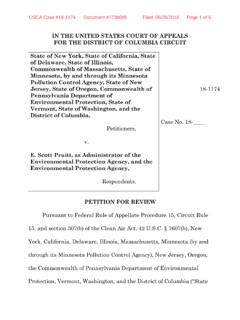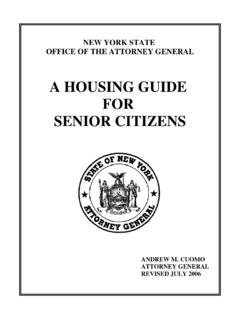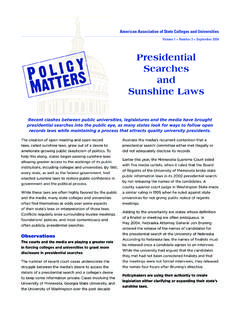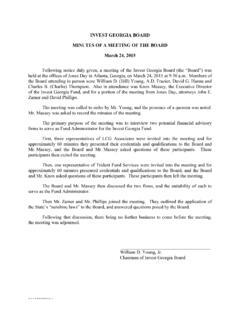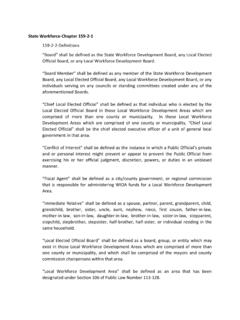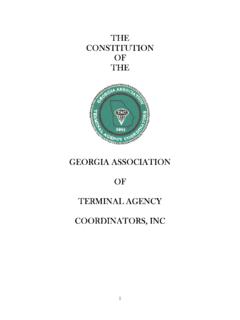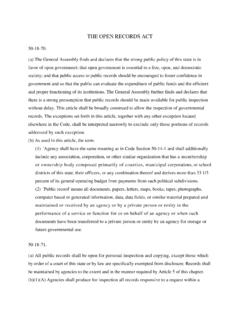Transcription of HOW TO HANDLE PROBLEMS WITH YOUR HOMEOWNERS …
1 1 The Real Estate Finance Bureau has published brochures for condo unit owners andco-op owners, both of which are available on TO HANDLE PROBLEMS WITHYOUR HOMEOWNERS ASSOCIATIONM embers of HOMEOWNERS associations who are unhappy with how theirassociation is acting (or not acting) often do not know what they can do. This paper isdesigned to tell such HOMEOWNERS about some of their most cases there is no government agency that can help unhappy ownerswho are having PROBLEMS with their HOMEOWNERS association (HOA). The AttorneyGeneral's office regulates only the offer and sale of real estate securities (which includesinterests in HOAs). It generally does not become involved in owners PROBLEMS with boardsof directors after the sponsor is no longer in control of the board. However, this office maybe able to help you if the sponsor of the HOA is not keeping the commitments which itmade in the offering plan.
2 If this is the case, owners may contact the Attorney General bysending a letter to: Real Estate Finance Bureau, New York State Department of Law, 120 Broadway (23rd Floor), New York, you may know, a HOMEOWNERS association is an organization establishedto govern a private community. Typically it owns and manages some common property forowners of private houses or condominium units. By buying a lot and/or home, an ownerautomatically becomes a member of the HOA of which it is a part. Before offering to sellmemberships, a sponsor must file an offering plan with the Attorney General if sales ofindividual homes, lots or condo units are involved, unless it is exempted by law orregulation. Most HOAs are corporations established under the Not-for-Profit CorporationLaw. An HOA is similar to other corporations -- it is governed by a board of directorselected by the members and a set of rules called by- laws .
3 Books and records of financialtransactions must be kept, taxes paid, and certain services provided to members. Usuallythe board has an annual budget prepared to estimate expenses, and then assesses eachmember a share of the vary greatly in the services which they provide. The developerestablishes the scope of the association initially by setting out the services and expensesin the association's budget. The declaration provides the means by which the associationcan enforce the members' obligations and the by- laws set forth the procedures for runningthe association. Generally, the developer controls the association at first and relinquishescontrol to the individual owners some years primary purpose of the association is to protect and preserve the valueof the privately and commonly used property. In furtherance of that goal there may berestrictions concerning pets; requirements as to fence height; or limitations on the numberof cars allowed in the driveways.
4 These rules often conflict with the desires of an individualowner but exist for the general good of the entire community. In addition, the associationmay have the responsibility to repair and maintain portions of the community, such asroads, roofs, and recreation individual owner in a HOMEOWNERS association has the opportunity tobecome involved and participate in the on-going affairs of the community, and theresponsibility to assure that the association's actions conform to the by- laws ProblemsPerhaps your HOA seems dormant -- you never receive notice of meetings,nor are you given financial statements which explain how the assessments you pay arebeing spent. Perhaps repairs are neglected and snow not removed as quickly as youexpect. Or a nuisance created by your neighbor is allowed to continue. Maybe one owneris allowed to build a deck and another is refused permission to do the same PROBLEMS may arise while the association is still under the developer'scontrol.
5 Be aware that the HOA is an independent body whose functions must not bemerged with the corporate functions of the developer. The developer creates and controlsthe association initially, but has a duty to protect the investment of the members and torespond to the needs of the association with a sense of fairness and good faith. From thetime of the first closing with a member, the developer must abide by the terms of theoffering plan, the by- laws of the association and the declaration in the same way that a laterindependent board the FactsThe way to begin dealing with your PROBLEMS with the board is to understandwhat rights you have. There are two kinds of research to Check the documents for your HOA -- the declaration, certificate ofincorporation, and by- laws . Copies of these document should be available from the boardof directors or developer; a copy of the declaration and by- laws is in your offering documents should include information on.
6 What the HOA is responsible the declaration can be amended (includingpercentage required).how members of the board of directors members of the board can be powers and duties of the board of annual owner meetings are special meetings are remedies exist when a homeowner defaultson his or her obligations including Look at the Not-for-Profit Corporation Law, the New York State law whichgoverns the establishment of most HOMEOWNERS associations. The decisions made bycourts in cases involving the law are the case law which interprets the Not-for-Profit Corporation Law (NPCL) is published as volume 37 ofMcKinney's Consolidated laws of New York Annotated ("McKinney's") which can be foundin law libraries, many lawyers' offices, and in certain public libraries. Included in volume37 are brief descriptions of case provisions of the NPCL and the sections in which they are found,include the following:An HOA may have different classes of members.
7 NPCL 601. By- laws may be adopted, amended or repealed by the members with theappropriate vote, as provided in the by- laws . NPCL meeting of the members is to be held annually. NPCL may call special meetings, as authorized in the certificate ofincorporation or by- laws , or if at least 10 percent of the members wish to doso. NPCL may be elected at a special meeting. NPCL (authorizing another member to vote for you) are permitted subjectto provision in the by laws or certificate of incorporation. NPCL may request that elections be supervised by an inspector. NPCL right to vote may be limited by the certificate of incorporation or by- laws .(For example, there may be no right to vote until the developer gives upcontrol.) NPCL may be taken on written consent of members without a may demand to see the corporate books and records of accounts,minutes of meetings, and a list of members.
8 NPCL derivative action may be brought by five percent or more of the membersof the corporation. NPCL may be removed with or without cause, as determined by thecertificate of incorporation and by- laws . NPCL restricted by the certificate of incorporation or by- laws the board ofdirectors may take action without holding a meeting if all members of theboard consent in writing to the action. NPCL actions by a director or officer constitute a conflict of interest, andmay be void or voidable if no disclosure was made. NPCL and officers must act in good faith and with reasonable diligence,care and skill. NPCL and officers may be sued for misconduct. NPCL the Problem: First ApproachIf the board of directors is not complying with its own certificate ofincorporation, declaration or by- laws , you should point this out, in a tactful way, expressingthe expectation that the matter will be corrected.
9 Sometimes this is all that is needed tosolve a problem. If a simple oral request to an officer of the board fails, you can write aletter. It should be factual, brief and not hostile. Keep copies of any letters that you send,and notes of telephone conversations (the date, time, who called whom, and the gist of thediscussion) in case the matter is not quickly attempt to influence the board is always more persuasive if it is presentedby a significant number of members. If your problem is one that others are affected by, itis worth organizing the other members. If you do, and the attempt to change the situationis not successful, the organized group can always seek to elect new directors at the nextannual meeting. Retaining a LawyerIf your efforts to resolve your PROBLEMS with the board fail, you may want toretain a private lawyer. The Attorney General's office cannot recommend private , a few points may be is a good idea to select someone withexperience in handling HOA PROBLEMS .
10 Youcould begin looking for an attorney by talkingwith members in your or other HOAs and withattorneys in other specialty areas. If this fails,you may wish to contact a local Bar Associationfor referrals..Some lawyers will not charge for a single initialconsultation or will charge only a minimal lawyers will attempt to resolve any matterthrough negotiation before considering litigation,as litigation is costly and usually against the board of an HOA, peoplewith whom one lives, can also be very ConclusionIf serious PROBLEMS arise, which the board is not addressing, such as a bank'sthreatening to foreclose on a mortgage on the Association s common property or adeveloper's failing to pay common charges on unsold houses or lots, it is important to actswiftly. Often such PROBLEMS can be resolved, relatively simply, if members organize andact right that members of HOA boards are usually other owners who areserving without pay.





